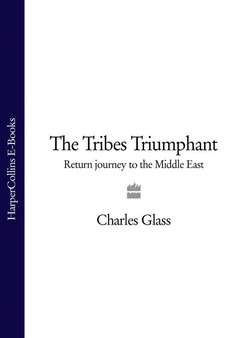Читать книгу The Tribes Triumphant: Return Journey to the Middle East - Charles Glass, Charles Glass - Страница 28
Palestinian Neighbours
ОглавлениеEmma Gilmour, pregnant and every inch a natural beauty, was driving me through West Jerusalem with her three children in the back seat. The car was a big Land Rover, white with United Nations number plates. We stopped at a red light near Yemin Moshe, the pretty collection of old stone cottages that Jerusalem’s mayor lent to visiting artists and writers. The driver of a car beside us motioned to me to roll down my window. His knitted kippa covered most of his clipped hair above a short, patchy beard. He pressed a printed sign against his window for us to read: ‘UN UNwelcome No Bodies, Go Home!’ This spontaneous act of bravery seemed to please him. The light changed, and we went our separate ways. Later, I told a friend at another United Nations agency about it. She said the settlers did that all the time: ‘They hate us.’
At six in the evening, the Gilmour children were having tea in the kitchen of their house in Abu Tor. The lights went off. Caitriona, one of the prettiest and most fey three-year-olds I knew, cried. She was not noisy. She was afraid. Emma lit candles so that the children could see their food. Outside, all the streets and houses of Silwan and Abu Tor were in darkness. In the distance, the Jewish quarters of west Jerusalem were in full light. Their power was never off. Ours came on again an hour later, while the children were in a candlelit bath.
From time to time at the Gilmours’, Palestinians neighbours would drop by. One was a young woman, who, like Emma, was about to have a baby. You meet people and don’t think much about them, until someone tells you that this pregnant woman with a bridal veil of dark hair had spent two years in prison. And you look at the young mother, playing with her children, and you ask yourself, as you would in a country where people were free, what she could have done to merit a two-year sentence. Later, Emma told me her story.
After the Israeli security forces shot dead fourteen unarmed young men for throwing stones in the Al Aqsa mosque grounds, Intisar took a knife from her kitchen and went down to Jerusalem to take revenge. Several other Palestinian women – not in concert or with any plan – did the same. They went, each on her own, to the Jewish Quarter of the old city to stab an Israeli settler. Did Intisar stab anyone? No. The soldiers searched her, found the knife, put her under arrest and sent her to the court that passed judgement. Two years later, she went home.
Another woman came to the Gilmour house one evening to babysit the children, so that Emma, Andrew and I could go to Fink’s Bar for dinner. She did not say much. Her dress was black, and her long hair had almost as many white strands as brown. In the car on the way into the city, Andrew and Emma told me that the Israelis had shot and killed her husband at the end of the June 1967 war. She raised five children on her own. Her husband’s family offered her no help, unusual in Arab society in which children are the responsibility of the paternal family. She refused payment for babysitting the Gilmour children. To look after the younger son, Xan, I’d have demanded a year’s salary. In return for the favour of watching her neighbours’ children, the widow expected reciprocal favours: a ride into Jerusalem, help with her shopping, advice. It was an exchange between equals.
